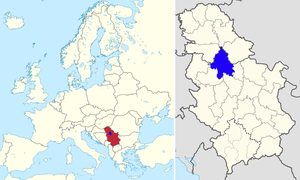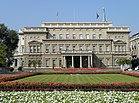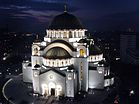Belgrade District
|
Belgrade Beograd / Београд |
||||||||
|---|---|---|---|---|---|---|---|---|
| Capital of Serbia | ||||||||
| City of Belgrade | ||||||||
|
||||||||
|
||||||||
 Location in Europe and Serbia |
||||||||
| Coordinates: 44°49′N 20°28′E / 44.817°N 20.467°ECoordinates: 44°49′N 20°28′E / 44.817°N 20.467°E | ||||||||
| Country | Serbia | |||||||
| District | City of Belgrade | |||||||
| Municipalities | 17 | |||||||
| Establishment | Prior to 279 B.C. (Singidunum) | |||||||
| Government | ||||||||
| • Mayor | Siniša Mali (SNS) | |||||||
| • Ruling parties | SNS/SPS-PUPS/DSS | |||||||
| Area | ||||||||
| • Capital of Serbia | 359.96 km2 (138.98 sq mi) | |||||||
| • Urban | 1,035 km2 (400 sq mi) | |||||||
| • Metro | 3,222.68 km2 (1,244.28 sq mi) | |||||||
| Elevation | 117 m (384 ft) | |||||||
| Population | ||||||||
| • Capital of Serbia |
|
|||||||
| • Rank | 1st | |||||||
| • Density | 3,241/km2 (8,390/sq mi) | |||||||
| • Urban |
|
|||||||
| • District |
|
|||||||
| • District density | 514/km2 (1,330/sq mi) | |||||||
| Time zone | CET (UTC+1) | |||||||
| • Summer (DST) | CEST (UTC+2) | |||||||
| Postal code | 11000 | |||||||
| Area code(s) | +381 11 | |||||||
| ISO 3166 code | RS-00 | |||||||
| Car plates | BG | |||||||
| Website | www |
|||||||
Belgrade (/ˈbɛlɡreɪd/ BELL-grade; Serbian: Beograd / Београд; Serbian pronunciation: [beǒɡrad]; names in other languages) is the capital and largest city of Serbia. It is located at the confluence of the Sava and Danube rivers, where the Pannonian Plain meets the Balkans. Its name translates to "White city". The urban area of the City of Belgrade has a population of 1.34 million, while over 1.65 million people live within its administrative limits.
One of the most important prehistoric cultures of Europe, the Vinča culture, evolved within the Belgrade area in the 6th millennium BC. In antiquity, Thraco-Dacians inhabited the region, and after 279 BC Celts conquered the city, naming it Singidūn. It was conquered by the Romans during the reign of Augustus, and awarded city rights in the mid-2nd century. It was settled by the Slavs in the 520s, and changed hands several times between the Byzantine Empire, Frankish Empire, Bulgarian Empire and Kingdom of Hungary before it became the capital of Serbian king Stephen Dragutin (1282–1316). In 1521, Belgrade was conquered by the Ottoman Empire and became the seat of the Sanjak of Smederevo. It frequently passed from Ottoman to Habsburg rule, which saw the destruction of most of the city during the Austro-Ottoman wars. Belgrade was again named the capital of Serbia in 1841. Northern Belgrade remained the southernmost Habsburg post until 1918, when the city was reunited. As a strategic location, the city was battled over in 115 wars and razed 44 times. Belgrade was the capital of Yugoslavia from its creation in 1918, to its final dissolution in 2006.
...
Wikipedia








